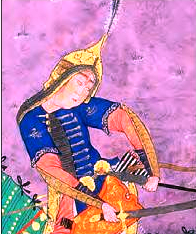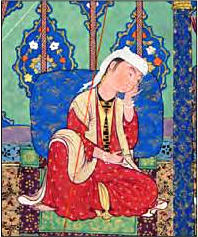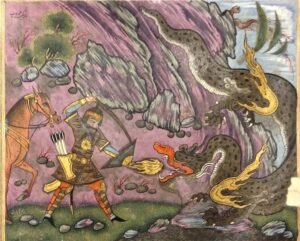Join Tessa Gratton and me as we read the Shahnameh by Abolqasem Ferdowsi. We’re using the Dick Davis translation (Penguin Classics).
Today’s portion: The Tale of Sohrab
Synopsis: Rostam has a son with a Turkish princess, who grows to be as strong a warrior as him. They meet on the battlefield not knowing each other, and Rostam kills Sohrab.
TG: My lack of sympathy for Rostam and Kay Kavus impeded my ability to feel the tragedy of this section. (At least everyone else in the story agrees with me that Kavus is an idiot who never makes good choices. It amuses me how often his allies openly call him names, just never to his face!)
I usually enjoy this sort of tragic set up, as I’m very interested in how character flaws create tragedy. For Sohrab, I felt it very keenly: he’s arrogant and ambitious as his father, and too young to know better, but at the heart of his motivations he really just wants to meet his father and make his father king, not himself. But Rostam’s flaws weren’t what created his tragedy here, it was a sudden, uncharacteristic refusal to acknowledge his name. Never before has Rostam avoided declaring his name and ancestry, so it was out of left field when he flat-out lied to Sohrab about being himself. If he’d admitted his name, Sohrab would have flung his arms around his father and none of the tragedy would’ve occurred. This is the first time I feel let down by the storytelling itself, because this was a case of inexplicable miscommunication that required Rostam acting totally out of character to achieve.
Once again, I enjoyed Afrasyab’s role here. When he heard about Sohrab and Sohrab’s ambitions I love that he just laughed. And then encouraged chaos.
I’m very glad to move away from Rostam for a while in the next section, though I suspect it will be full of Kavus being stupid.
KE: I have a lot of rambling thoughts about this section.
First, my understanding is that this is considered the central tragic tale of the Shahnameh. Like you, I struggled with Rostam — in fact I have always struggled with Rostam, who is the great hero of the piece and who I find deeply unsympathetic and pretty much a self centered jerk. I keep contrasting him to his father, Zal-Dastan, and while Zal is clearly a prince with all the privilege and pride that goes with that status, he at least seems to have more of a sense of responsibility and community in the sense of having long-standing relationships with others while Rostam seems to mostly function alone. Zal has a wife, while Rostam has a one night tryst with a woman WHO SNEAKS IN TO SEDUCE HIM (otherwise he evidently can’t be bothered?). He receives communication from Tahmineh about their son but otherwise evidently can’t be bothered to write to him, send for him, or go see him, much less have any sort of relationship with her (maybe because she is a Turk?). He really seems to live only for himself and his status as a hero. And, yes, he treats his horse badly. Mediocre!
So, just as you said, Rostam’s inexplicable refusal to admit to who he is did not make sense to me in context. It did feel as if it was pushing a tragic flaw for the sake of the story.
What DID touch me about Sohrab’s death was that Sohrab did suspect that Rostam was indeed Rostam, and thus his father. He is deliberately misled by Hejir, and yet still trusts his instinct that Rostam means something to him. He gives Rostam multiple chances to admit it; he TRIES to reconcile, to connect, and Rostam rejects him. And Sohrab even throws it in his face in the end– that if he had only said his name, none of it would have happened.
And on top of that it turns out that Kavus COULD HAVE saved Sohrab’s life with his magic potion but refused. Such a jerk. A completely useless selfish jerk of a jerk. And yet (I read ahead to the first part of the next sequence) the ladies are all over him. What is up with that? I admit that I too enjoyed all his lords talking smack about him behind his back. He has certainly earned it.
The final tragic blow of course is Rostam riding himself to beg the potion from the king only to have Sohrab die, alone, while Rostam is gone. Poor kid.
However in this sequence there were two very interesting bits with ladies.
First, Tahmineh. Again, we see young women living in relative seclusion, and yet making for themselves sexual choices and not being chastised or punished for it. Perhaps this is because heroes are always acceptable lovers. I don’t know. But she sneaks in, she has sex with him, she gives birth nine months later, and not a peep about virginity or honor or any of that. The child is raised as a prince, not as a bastard. This fascinates me, especially given how often people claim that in the past women’s sexuality was completely locked down and it is only now in the modern world that women have their first taste of sexual freedom. Again and again the Shahnameh puts the lie to that old canard.
Second, Gordafarid! How great is she? I wish I knew if there is an entire set of tales about her, or where she comes from, or how she fits into the legendary cycle. Because she was awesome: she’s a skilled warrior AND she outwits young Sohrab. She made me very happy although there’s no further mention of her, alas.
Another image of Gordafarid:
Next week: The Legend of Seyavash (we are reading this in three parts because it is so long)(the first part starts on page 215 and goes to the bottom of page 237 — the second part will start with the section ‘Seyavash Writes a Letter of Kavus’)
Looks like Sudabeh takes an unpleasant turn, and Afrasayb is back.
Previously: Introduction, The First Kings, The Demon King Zahhak, Feraydun and His Three Sons, The Story of Iraj, The Vengeance of Manuchehr, Sam & The Simorgh, The Tale of Zal and Rudabeh, Rostam, the Son of Zal-Dastan, The Beginning of the War Between Iran and Turan, Rostam and His Horse Rakhsh, Rostam and Kay Qobad, Kay Kavus’s War Against the Demons of Manzanderan, The Seven Trials of Rostam, The King of Hamaveran and His Daughter Sudabeh






